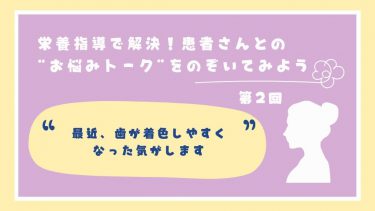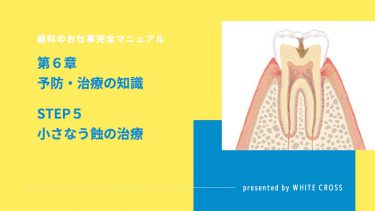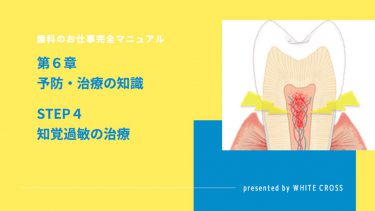みなさん、こんにちは。歯科衛生士の柏井伸子です。
日本では新型コロナウイルス感染、第6波のピークが見えはじめてきました。
一方海外では武力紛争が勃発し、被害を受けた建物や避難する高齢者の映像が連日放映されています。
空襲を避けるために設けられた施設や、隣国に逃れてきた大勢の避難民が集まっている場面を見る度に、「感染症拡大防止に三密を避けましょう」という対応をとることができる平和な社会のありがたさを感じます。
せめて、そのような施設内でクラスターが発生しないことを祈ります。
前回までは、「口腔ケアが認知症患者における認知機能を改善しかた否かについて行われた観察」についての論文の前半を読み、用語について解説しました。
前回までの記事はこちら
No.1 英語論文に対するハードルを低くする方法
No.2 論文の概要をつかむ方法
今回は論文の後半部分を読み、全体を総括していきます。
論文前半のおさらい
今回取り上げた論文『Effect of oral care on cognitive function in patients with dementia(認知症患者の認知機能に対する口腔ケアの効果)』の前半部分では、「どのような患者さんを研究対象にしたか」ということが説明されていました。
研究対象となった患者さんを口腔ケアの有無によって2グループに分け、全身疾患の既往歴や身体的および精神的検査、MMSE、ADL把握のためのバーセルインデックスといった、一連の検査によって評価していきました。
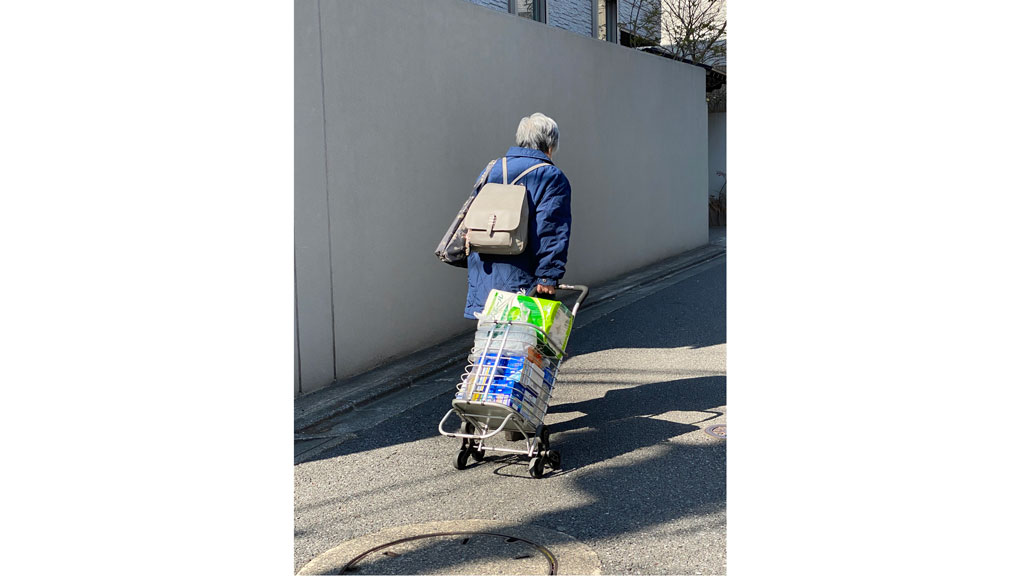
被験者が受けた口腔ケアの内容は?
論文の後半には、研究期間中の状況や最終的なベースライン、MMSEの変化、さらに口腔機能改善のための口腔ケアの役割などが記述されています。
最後まで、一緒に読み進めていきましょう。
During follow up, nurses or caregivers cleaned the patients’ teeth with a toothbrush for approximately 5 min after each meal. The brushing was carried out as usual daily tooth-brushing without dentifrice, including brushing the palatal and mandibular mucosa and tongue dorsum.
In the no oral care group, several patients carried out tooth-brushing by themselves once a day or irregularly.In subjects who could not clean their mouth by themselves, oral care was carried out by caregivers if requested.
ここでは、「被験者にどのような口腔ケアを行ったか」について説明されています。
口腔ケアを受けるグループでは、看護師や介護者によって毎食後約5分間ブラッシングが行われました。その際使用した歯ブラシは一般的なもので、歯磨剤は使わずに、口蓋や下顎粘膜、舌背も含めて清掃しました。
一方口腔ケアを受けないグループでは、多くの被験者が自分で1日1回もしくは不定期にブラッシングを行ったり、希望に応じて介護者が磨いたりしたとのこと。
A total of 81 patients used dentures. In both groups, dentures were cleaned with a denture brush every day and with denture cleanser once a week.
Dentists or dental hygienists administered professional care, such as plaque and calculus control, as necessary once a week for the oral care group.
被験者240名のうち81名が義歯を使用しており、2グループとも毎日義歯用ブラシでブラッシングし、週1回は洗浄剤を使用したとのこと。
また、口腔ケアを受けるグループでは、歯科医師や歯科衛生士がプラークや歯石を除去するプロフェッショナルケアを、必要に応じて週1回行いました。
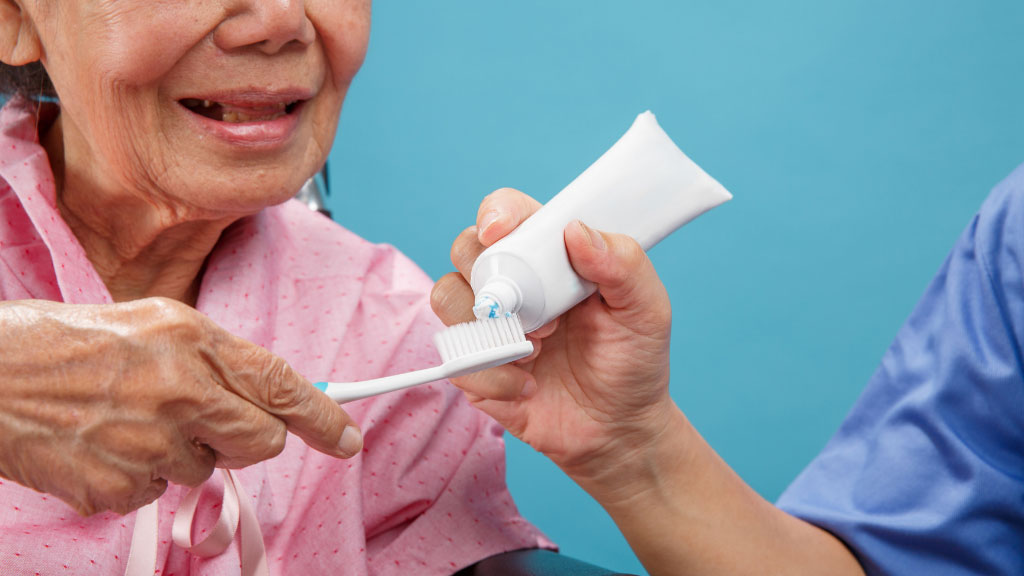
口腔ケアは認知機能にどう影響する?
次の段落からは、それぞれのグループにおけるMMSEやバーセルインデックスの結果が示されています。
At baseline, MMSE of the oral care group and no oral care group were 18.2±5.1 and 17.8±5.7, respectively. There was no significant difference between them.
Differences of MMSE from baseline are shown inFigure 1, and there were significant differences between the oral care group and no oral care group at 6 months(P<0.05) and 12 months (P<0.05).
ベースラインにおけるMMSEは、口腔ケアを受けるグループで18.2±5.1点、受けないグループで17.8±5.7点と、2グループ間に有意差はありませんでした。
しかし6ヶ月および12ヶ月経過後には、MMSEの変化に有意差が示されました。
The Barthel Indexes at baseline were 48±27 and 50±30 in the oral care group and no oral care group, respectively. The Barthel Index did not change during 1 year in the oral care group and no oral care group (46±22 and 47±27, respectively) and there was no significant difference between them.
また、ベースラインにおけるバーセルインデックスは、口腔ケアを受けるグループで48±27、受けないグループで50±30と、こちらも有意差はありませんでした。
そして、バーセルインデックスにおいてはどちらのグループも12ヶ月間経過後もベースライン時と変わらず、2グループ間に有意差はなかったようです。
Until now, it has been reported that communication with others was effective for the cognitive function of the patient.The present study proved that oral care contributed to preventing degradation of cognitive function in dementia.
Oral care has been proven to be a benefit for the prevention of pneumonia in self care dependent older patients and physical complaints of unknown origin, and even mortalities in older adults.
To the best of our knowledge, this is the first report to show that oral care influences cognitive function in dementia patients.
今までの研究では、「他者とのコミュニケーションは認知症患者の認知機能に効果をもたらす」ということが報告されてきました。
そしてこの研究では、認知症患者における認知機能低下の予防策として、口腔ケアが有効であるかということを検証していました。
口腔ケアは高齢者が自立した生活を営む上で、肺炎や不定愁訴を予防したり、死亡率を改善するという利点が立証されています。
この研究は、口腔ケアが認知症患者の認知機能に影響を与えることを初めて示したといいます。
Oral care stimulates sensory areas of the cortex related to oral function, which occupies relatively large areas of the sensory area of the cortex, and improved swallowing reflexes, resulting in preventing aspiration pneumonia.
Oral care might be a benefit to improved chewing function, which would contribute to stimulating the oral sensory area as well as nutritional improvement.
All of these beneficial effects on brain function might contribute to cognitive function. In geriatrics, the oral organ also tightly influences other organs, including the brain.
最後の段落では口腔ケアと感覚野の関連、認知症治療薬の効果との比較について述べています。
口腔ケアは、嚥下反射の改善や肺炎発症の予防に繋がる大脳皮質の感覚野を刺激し、栄養状態の改善と同様に、咀嚼機能や認知機能の改善にも貢献するとのこと。
老年医学において口腔という器官は、脳を含む他の器官に多くの影響を及ぼすといいます。
Donepezil has been used as a unique medicine to improve cognitive function in dementia. Oral care would contribute to cognitive function as much as donepezil.
Angiotensin converting enzyme inhibitors have been suggested to be a benefit for Alzheimer’s disease. Substance P would be a key material to influence Alzheimer’s disease as well as pneumonia.
Stimulation of any organ would be important to improve functions in older people. Oral care can be one of the key stimulations in cognitive function, as well as many other organ functions.
認知症治療薬である「ドネピジル」と口腔ケアは、認知機能に対して同程度改善することが報告されました。
アンジオテンシン変換酵素阻害薬はアルツハイマー型認知症に効果があるとされており、P物質は肺炎と同じく、アルツハイマー型認知症への関連物質です。
高齢者の機能改善には多くの器官に対する刺激が重要で、口腔ケアは多くの器官だけでなく、認知機能においても重要な刺激となることができる、とまとめられています。

論文抄読のまとめ
ここまで、認知症と口腔ケアに関する論文を読んできました。
最後の段落にでてきた「ドネペジル」は、アルツハイマー型認知症やレビー小体型認知症の治療に用いられる薬物で、コリンエステラーゼ阻害薬の一種です。
副作用として嘔気や嘔吐、下痢などの消化器症状があるため、服用中の患者さんに対応する際には状況確認が必要です*1。
認知症専門医の井桁之総先生は、認知症について「単なる大脳の器質的な疾患ではなく、発症と同時にいままでその家族が抱えてきた諸問題を表面化させる『家族的な病気』」と話します*2。

また他の研究において、22ヶ所の老人ホームに入居中の323名の重度認知症患者に対して、18ヶ月間にわたる調査を行った結果が報告されています。
その報告によると、認知症患者の臨床的症状が出現する頻度は、呼吸困難46%、痛み40%、褥瘡39%、神経の昂り54%、誤嚥41%、摂食嚥下障害86%であり、「介護者は患者さんの予後や臨床経過を見守らなければならない。」とまとめられています*3。
***
超高齢社会を迎えた日本において、歯科衛生士はう蝕や歯周病という局所的疾患のみに対処するのではなく、口腔も身体の一部であるという認識のもと、専門的なアプローチを行うことが求められます。
ぜひ多くの情報を有効活用できるように心がけていきましょう。
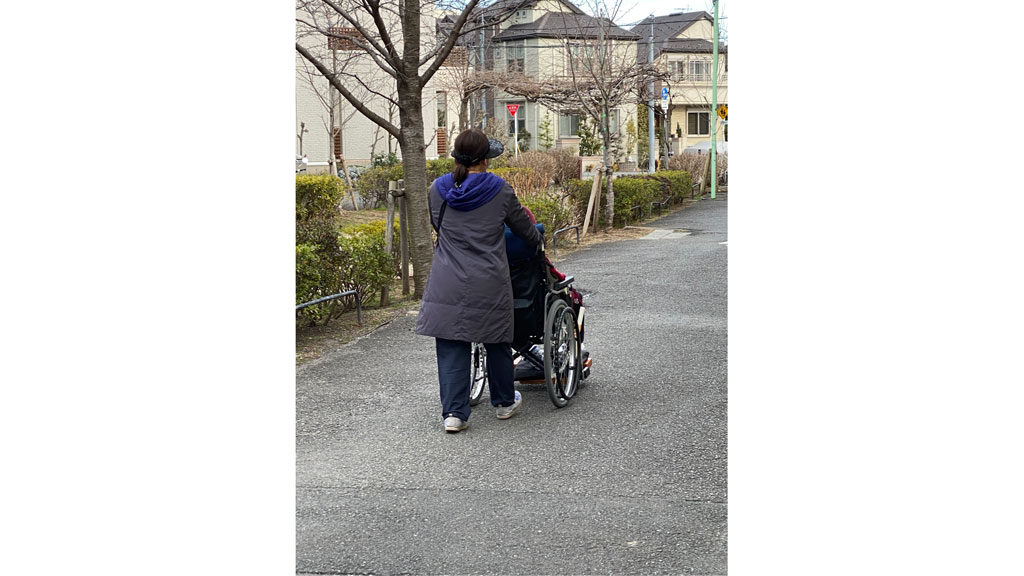
参考文献:
*1 一般社団法人日本老年歯科医学会他編(2019)『認知症の人への歯科治療ガイドライン』医歯薬出版株式会社
*2 井桁之総(2021)『認知症 ありのままを認め、そのこころを知る』論創社
*3 Mitchell SL, Teno JM, Kiely DK, et al.(2009) 「The clinical course of advanced dementia」『The NEW ENGLAND JOURNAL of MEDICINE』2009 Oct 15;361(16):1529-1538
論文を活用できる歯科衛生士になろう!
No.1 英語論文に対するハードルを低くする方法
No.2 論文の概要をつかむ方法
No.3 論文抄読のまとめ

